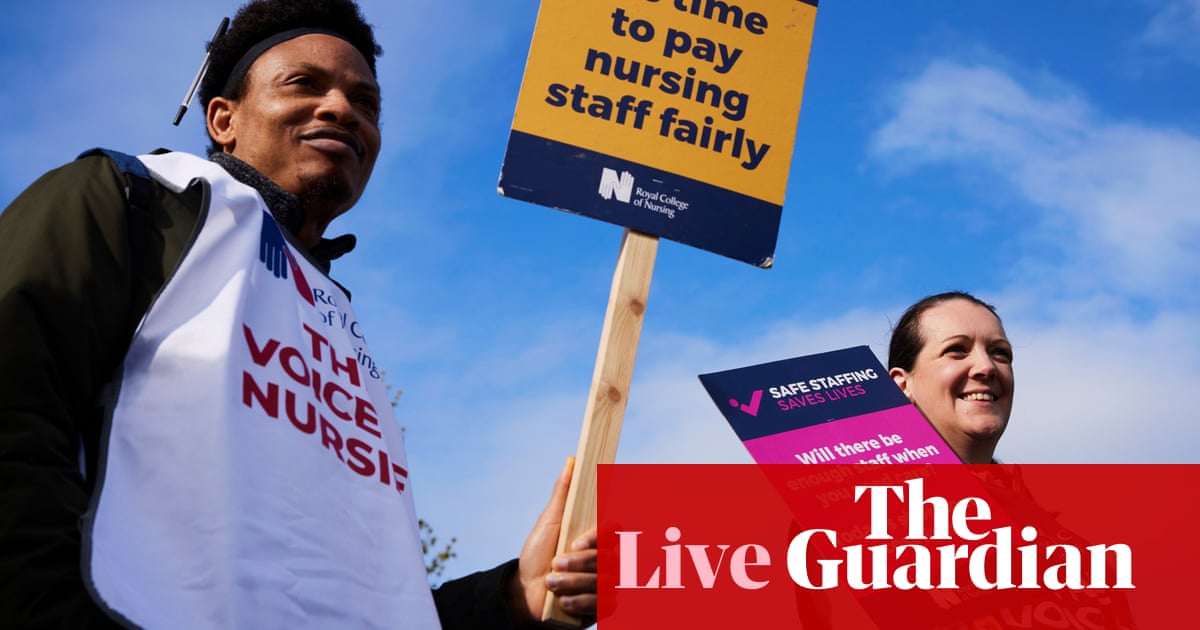
Early evening summary
Boris Johnson has comfortably won a vote on extending the Coronavirus Act, emergency legislation giving the government sweeping powers, for another six months. With Labour backing the government, there was no chance of defeat, but 35 Conservative MPs defied the whip and voted against the government. Some cited their concerns about the illiberal implications of the Coronavirus Act, but most of them were critical of the lockdown (which is largely enforced under different legislation - also extended today in a vote that went through on the nod). The Tory rebellion was smaller than the one in December on the new tiering restrictions (when 53 Conservatives voted against the government) and smaller than the one in October on keeping the 10pm curfew (when 42 Tories voted against). Sir Keir Starmer also suffered a rebellion because 21 Labour MPs defied the whip and voted against extending the act.
Boris Johnson has suggested that Covid status certificates are unlikely to be required until the whole population has been offered a vaccination, after MPs and scientists warned of the risk of a two-tier system if certification were required for pubs.
Ursula von der Leyen has revealed to EU leaders that 21m doses of Covid vaccine have been exported to the UK from suppliers based in the bloc’s member states as she emphasised the need to secure jabs at home.
That’s all from me for today. But our coverage continues on on global coronavirus live blog. It’s here.
And here is the breakdown, by party, of the 76 MPs who voted against extending the Coronavirus Act.
Conservatives: 35
Labour: 21
Lib Dem: 10
DUP: 7
Green: 1
Alliance: 1
Independent: 1 (Jeremy Corbyn)
The two tellers were Alistair Carmichael (Lib Dem) and Chris Green (Con).
The 21 Labour MPs who voted by voting against extending Coronavirus Act
And here are the 21 Labour Mps who voted against the party whip in the division.
Diane Abbott
Apsana Begum
Ben Bradshaw
Richard Burgon
Dawn Butler
Andrew Gwynne
Ian Lavery
Emma Lewell-Buck
Clive Lewis
Rebecca Long Bailey
John McDonnell
Ian Mearns
Kate Osamor
Kate Osborne
Bell Ribeiro-Addy
John Spellar
Graham Stringer
Zarah Sultana
Jon Trickett
Derek Twigg
Beth Winter
Sturgeon contrasts SNP"s 4% pay rise for NHS with Tories" "miserly" 1% offer in England
In Scotland Nicola Sturgeon, the first minister, has been campaigning for the SNP ahead of the elections in May and she has been highlighting her government’s decision to award NHS staff a 4% pay rise - in contrast to the 1% pay increase being offered to NHS staff in England. She said:
Politics is about choices, and the SNP chooses to back our NHS.
In this election we can build a country fit for the heroes who have kept us going every day through the pandemic.
We have to do more than clap for the people who look after us - we should give them fair pay for the work they do. That starts with a fair deal for our NHS staff ...
The Tories’ miserly 1% pay offer south of the border shows that they have the wrong priorities - people will no doubt wonder how they can find the money to massively increase their stockpile of nuclear weapons or build a bridge to Northern Ireland but refuse to find the money to properly reward those who were at the frontline of the pandemic.
The contrast has not gone unnoticed in England. Today Unison’s head of health, Sara Gorton, said Johnson should follow Sturgeon’s example. She said:
The Westminster government should learn from the approach being adopted north of the border on NHS pay and be shamed into following the Scottish example.
It is normal to view announcements like this mainly in terms of what they might do to support for independence in Scotland, but a new book, Englishness by the academics Ailsa Henderson and Richard Wyn Jones, describes how the perception that Scotland is getting more than England has been growing considerably in recent year, and is an important component of Englishness as a political force. In 2000 just 21% of people in England thought Scotland was getting more than its fair share of public spending. Now that figure is 38% - much higher than the proportion of English who complain about money going to Wales or Northern Ireland.
Henderson and Wyn Jones call this “devo-anxiety”, which they define as “the sense that England is unfairly treated both financially and politically within the union”, and their book, which is an essential read for anyone interested in nationalism and the future of the union (or in understanding Brexit), suggests its a much bigger problem for the future of the UK than is often realised.
The 35 Tory MPs who rebelled by voting against extending Coronavirus Act
Thirty five Tory MPs voted against the government in the division. Here is the full list.
They were:
Adam Afriyie (Windsor)
Steve Baker (Wycombe)
Harriett Baldwin (West Worcestershire)
Bob Blackman (Harrow East)
Peter Bone (Wellingborough)
Graham Brady (Altrincham and Sale West)
Christopher Chope (Christchurch)
Geoffrey Clifton-Brown (The Cotswolds)
Philip Davies (Shipley)
David Davis (Haltemprice and Howden)
Jonathan Djanogly (Huntingdon)
Richard Drax (South Dorset)
Mark Francois (Rayleigh and Wickford)
Marcus Fysh (Yeovil)
Mark Harper (Forest of Dean)
Philip Hollobone (Kettering)
David Jones (Clwyd West)
Pauline Latham (Mid Derbyshire)
Jonathan Lord (Woking)
Tim Loughton (East Worthing and Shoreham)
Craig Mackinlay (South Thanet)
Karl McCartney (Lincoln)
Stephen McPartland (Stevenage)
Esther McVey (Tatton)
Anne Marie Morris (Newton Abbot)
John Redwood (Wokingham)
Andrew Rosindell (Romford)
Henry Smith (Crawley)
Julian Sturdy (York Outer)
Desmond Swayne (New Forest West)
Robert Syms (Poole)
Craig Tracey (North Warwickshire)
Charles Walker (Broxbourne)
David Warburton (Somerton and Frome
William Wragg (Hazel Grove).
We should find out soon how many Tory MP rebelled in the vote.
On 1 December, when MPs voted for the tiering system coming into force after the second lockdown, 55 Conservatives rebelled (53 voting against the government, plus two acting as tellers). At the time that was the biggest government revolt of this parliament.
The last motions, one approving the Coronavirus Act one year status report and the other extending proxy voting and remote participation in the Commons until 21 June, went through on the nod.
MPs vote to renew Coronavirus Act by 484 votes to 76
MPs have voted to renew the Coronavirus Act by 484 votes to 76 - a majority of 408.
Preventing businesses from operating their own Covid rules would be un-Conservative, says Liam Fox
Earlier during the debate Liam Fox, the Tory former international trade secretary, said he would support the government even though he resented having to vote to extent the Coronavirus Act powers for another six months.
And he said this about Covid-status certificates.
We’re all used to having in international travel the concept that you cannot cross a border without having immunisation, that is a perfectly reasonable thing for any country including the United Kingdom to want to do.
It’s when it comes to domestic issues that I think there is a real problem. Where the government were to try to compel individuals to carry some proof of either immunity through vaccine or a negative test, I think that would be completely unacceptable in a country where civil liberties are held so highly and so prized.
I think however we as Conservatives should be very careful not to constrain the private sector in how they choose what customers they have. If they choose to have particular customers in particular ways, whether they’re airlines or pubs, that is up to them and again I would not like to see a Conservative government intervene in the freedom of the private sector to choose the customers that they have.
This is interesting because it is probably similar to what Boris Johnson thinks about this issue, and may be a good guide to what the government ends up proposing.
MPs are now voting on the motion to renew the Coronavirus Act.
This time MPs shout “no” when Nigel Evans, the deputy Speaker, puts the motion to the house and so there is a division.
We will get the result in about 15 minutes.
MPs are now voting.
The motion to extend lockdown restrictions enforced under the Public Health Act goes through on the nod.
Argar says that in his speech Richard Burgon seems to be arguing for a “zero Covid” approach. But Argar says Prof Chris Whitty, the chief medical officer for England, has said achieving zero Covid is impossible.
Back in the Commons Edward Argar, a health minister, is now winding up the debate. He says, as British MPs debate easing lockdown restrictions, in other European countries, like France, Italy, Germany and the Czech Republic, governments are moving in the opposite direction.
This is what Labour’s Richard Burgon told MPs in the debate about why he would vote against renewing the Coronavirus Act.
People have been brilliant throughout this whole crisis, looking after each other and respecting the lockdown rules. It’s the government that has failed.
And while the government continues to fail to put in place proper sick pay to those that need to self-isolate, a decent minimum income floor and other measures that deal with the deepening social crises that people in our communities face, I cannot support extending the government’s Coronavirus Act for six months more.
I will vote against this act and the government should bring back a better act, one that protects civil liberties and one that tackles both the public health and social crises.
Here is a question from below the line (BTL).
The answer is that vaccines are preventing a lot of people from getting very ill, and from dying, but not everyone. Initially, when the vaccines were approved, some ministers made comments suggesting deaths would no longer be a problem, but that is not what ministers or their officials are saying now.
A good guide to how effective vaccines are is the latest Public Health England vaccine effectiveness report (pdf). It’s for March 2021. Here is an excerpt.
Analysis of routine testing data continues to show a vaccine effect against symptomatic Covid-19 from either vaccine in those aged 70 year and over, for whom the vaccine effectiveness (VE) of a single dose reaches ~ 60% ...
As before, we find that among those who develop symptomatic infection, risk of hospitalisation is reduced by 35 to 45% after one dose of either vaccine. Combined with the reduced risk of becoming a case, this is consistent with a vaccine effectiveness against hospitalisation which is similar to previously reported value of 80%.
Data continue to show encouraging effects from a single dose of the Pfizer vaccination on risk of mortality in symptomatic cases over 80 who have been vaccinated, where the risk of death is reduced by 54%. Combined with the reduced risk of becoming a case, this is consistent with a vaccine effectiveness against mortality which is similar to previously reported value of 85%.
An 85% effectiveness rate against death is effectively a 15% non-effectiveness rate. So vaccines lower the risk considerably, but not totally.












